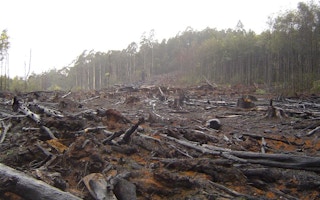For years, scientists have been puzzling over what exactly deforestation does to temperature. But a study published recently purports to have figured it out on the small scale. It finds clearing forests significantly increased local temperature in some of the most deforested places in North America, Europe and Asia.
Forests do things that both increase and decrease the temperature of the air around them. First, they’re dark, and dark things absorb more heat energy than light things, which reflect more of that energy back towards space. Clearing a forest generally makes an area lighter and increases its reflectivity, or “albedo.”
Trees also emit gases that help form compounds that warm the atmosphere like ozone and methane. But they also emit cooling gases, and previous research published earlier this year found that, together, these gases have more of a cooling effect than a warming one.
New research published recently in Nature Climate Change adds to the argument that deforestation increases local temperatures. Researchers at the Institute for Atmospheric and Climate Science (ETH) in Switzerland and the Max Planck Institute for Meteorology in Germany combined observations with climate models to see if they could discern patterns between land cover and temperature changes.
“
Decision makers who have to decide what the land should be used for – agriculture, biodiversity protection, reforestation to sequester carbon – should be aware that these decisions can have implications for the climate of the particular region that they live in.
Quentin Lejeune, researcher, Institute for Atmospheric and Climate Science (ETH)
They discovered a correlation between deforestation and local temperature changes in many temperate mid-latitude locations around the world.
“During the industrial period, many areas over the mid-latitudes – especially in North America, the current Eastern Europe and Russia – experienced high rates of deforestation,” lead author Quentin Lejeune, a researcher at ETH,” told Carbon Brief.“We found that this led to significant local increases in daytime temperature during hot days.”
These increases were particularly high in North America. The study found that deforestation in heavily cleared regions of the central U.S. contributed as much as 1 degree Celsius to local maximum temperatures.
One degree might not seem like much, but even minute shifts in temperature can have drastic impacts on climate. Take, for instance, the Paris Agreement. One of its core goals is limiting global warming to less than 2 degrees Celsius, which scientists believe is the threshold of climate catastrophe.
Overall, the study indicates that deforestation contributes around one-third to average hottest-day temperature increases in places that lost at least 15 percent of their forest cover.
The researchers write in their study that planting forests could help bring local temperatures back down. And they urge that land cover changes be taken into consideration when forecasting future climate scenarios and planning ways to mitigate warming.
As Lejeune told Carbon Brief: “Decision makers who have to decide what the land should be used for – agriculture, biodiversity protection, reforestation to sequester carbon – should be aware that these decisions can have implications for the climate of the particular region that they live in.”
This story was published with permission from Mongabay.com. Read the full story.

















